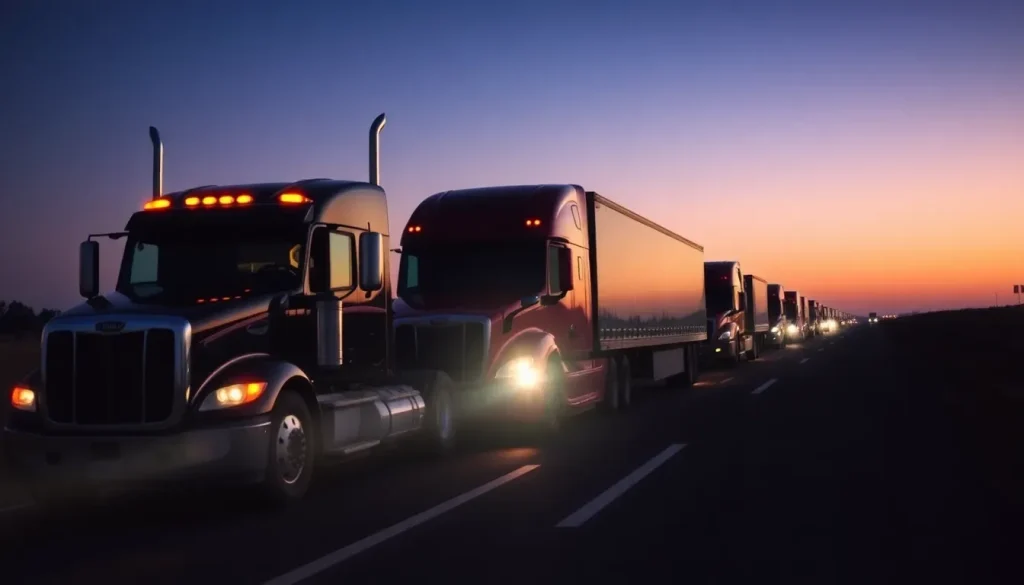Truck drivers experience border delays despite outage resolution, CBSA

The challenges faced by truck drivers at border crossings can significantly disrupt supply chains and affect delivery timelines. When unexpected outages occur, the impact can ripple through the entire transportation system. Understanding the implications of such disruptions is crucial for both drivers and logistics companies alike.
Recently, the Canada Border Services Agency (CBSA) resolved a system outage that had created substantial delays for commercial drivers. Despite the restoration of services, the agency is still working to address a backlog of processing requests, leaving many drivers waiting longer than anticipated. This article explores the ongoing delays, what factors contribute to them, and how the CBSA is managing the situation.
- Current situation for truck drivers at the border
- Extent of delays reported by truck drivers
- How are border agencies responding to the backlog?
- What does the CBSA check for at border crossings?
- Does the CBSA have the capacity to handle these delays effectively?
- Future considerations for truck drivers and logistics
Current situation for truck drivers at the border
Although the CBSA has restored its systems, truck drivers are still experiencing significant delays at border crossings. This is largely due to the backlog of requests that accumulated while the systems were down. Many drivers have reported waits extending from several hours to even days.
A spokesperson from the CBSA stated, “Primary inspection lanes are staffed with officers to process traffic and shipments. We are actively collaborating with our partners to ensure traffic management.” This indicates that even with personnel on duty, the sheer volume of vehicles and shipments continues to challenge normal processing times.
Extent of delays reported by truck drivers
Many truck drivers have shared their frustrating experiences while navigating the congested border crossings. For instance:
- Prabdeep Singh, a truck driver from Ontario, reported waiting over 30 hours to cross the Ambassador Bridge into Windsor.
- Singh began his journey by uploading his paperwork at 11 a.m. on October 1, expecting to clear within two to three hours. However, by 5 p.m. the next day, he still hadn't received any acknowledgment from the CBSA.
- After receiving the go-ahead from his dispatcher, he faced three additional hours of waiting in traffic, moving only 10 miles (approximately 16 km).
- Ultimately, he crossed into Canada around 8:30 p.m., but the delay caused disruptions to his delivery schedule.
Another trucker, Jot Singh, faced similar challenges, inching through the queue for three hours before reaching the Ambassador Bridge. These experiences highlight how operational delays can impact not only individual drivers but also the broader logistics network.
How are border agencies responding to the backlog?
In response to the recent delays, the CBSA has implemented several measures to expedite processing and improve traffic flow at border crossings:
- **Increased staffing**: Officers are being deployed to primary inspection lanes to manage traffic more effectively.
- **Collaboration with partners**: The CBSA is working closely with transportation and law enforcement agencies to mitigate congestion.
- **Ongoing monitoring**: Systems are under constant surveillance to ensure stability and efficiency as traffic returns to normal levels.
The Niagara Falls Bridge Commission (NFBC) also announced that travel warnings for Canada-bound commercial traffic have been lifted, signaling some improvements in border conditions. However, the agency cautioned that monitoring will continue, especially over the weekend, in anticipation of increased commercial traffic volumes moving forward.
What does the CBSA check for at border crossings?
The CBSA conducts thorough inspections at border crossings to ensure compliance with various regulations. Some of the key areas of focus include:
- **Documentation**: Verification of proper paperwork for shipments.
- **Customs declarations**: Ensuring that all goods are declared appropriately.
- **Safety regulations**: Compliance with safety standards for transportation and hazardous materials.
- **Immigration checks**: Validating the immigration status of drivers and accompanying personnel.
The comprehensive nature of these checks is essential for maintaining border security and ensuring that all commercial traffic complies with legal requirements.
Does the CBSA have the capacity to handle these delays effectively?
With the recent surge in delays, questions have arisen regarding whether the CBSA is adequately staffed to manage the increased workload. Some truck drivers and industry experts have expressed concerns about potential understaffing issues, particularly during peak travel times.
While the CBSA has indicated that they are deploying additional officers to aid in processing, the lingering backlog suggests that the agency may still face challenges in meeting demand. A review of staffing levels and operational efficiency could be beneficial in addressing these concerns in the long term.
Future considerations for truck drivers and logistics
The ongoing challenges at the border highlight the importance of contingency planning for truck drivers and logistics companies. Here are several strategies that can help mitigate the impact of future disruptions:
- **Real-time tracking**: Use technology to monitor border wait times and adjust routes accordingly.
- **Flexible scheduling**: Build in buffer times to account for potential delays during cross-border trips.
- **Communication with dispatch**: Maintain open lines of communication with dispatchers to stay updated on border conditions.
- **Prepare for alternative routes**: Identify alternative border crossings that might be less congested.
The complexities of cross-border logistics require adaptability and foresight, particularly in the face of unexpected outages and delays.
To gain further insight into the challenges faced by truck drivers during these delays, you can watch this video report:
The importance of efficient border processing cannot be overstated, as it plays a critical role in the overall health of the supply chain. As the CBSA works to resolve backlogs and streamline operations, the road ahead remains challenging for many commercial drivers.




Leave a Reply